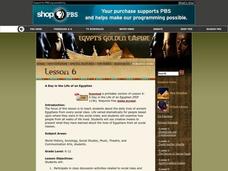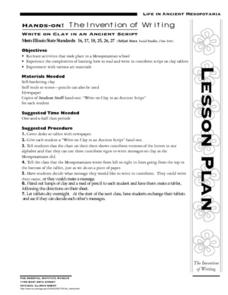Curated OER
Ancient India
Sixth graders create a travel brochure highlighting the accomplishments of the Indus Valley civilization. Group work allows students to create brochures illustrating the location, government, religion, agriculture, cultural and...
Curated OER
Urban Ecosystems 2: Why are There Cities? A Historical Perspective
Second in a series of five lessons, this lesson encourages preteens to consider cities as urban ecosystems. First, they keep a food diary for a few days. They visit the Natrional Agricultural Statistics Service website for current data...
Curated OER
Wheat: Ancient and Ageless
Students label the parts of a wheat plant on a worksheet. In this Egyptian farming instructional activity, students thresh a wheat stem and estimate the amount harvested. Students research Ancient Egypt online.
Curated OER
Ancient Civilizations: Mesopotamia
Learners read about the ancient civilization of Mesopotamia. They investigate the art, culture, and history, and read an overview about the gods and goddesses.
Time Warp Trio
The Seven Blunders of the World
Learners explore the cultures and civilizations of Mesopotamia. They take a look at the factors that shaped the region, and study the history of the Hanging Gardens of Babylon, and other ancient wonders of the world. The class is divided...
Tutankhamun
Pharaohs, Pyramids and the World of the Gods
Your young historians will learn all about the pharaohs, pyramids, and gods of ancient Egypt with these informational text worksheets, each of which are accompanied by hands-on, follow-up activities.
Curated OER
Ancient Recipes
Students explore how foods and their preparation differ over time and from culture to culture. An ancient recipe for the preparation of goat, found by archaeologists, is examined and discussed by the students.
Curated OER
Ancient History
Young scholars investigate the concept of water usage and conservation. The differences between modern and ancient practices are considered. They conduct research into the economic and social characteristics of ancient civilizations like...
Curated OER
Hammurabi's Code: What Does It Tell Us About Old Babylonia?
Students examine life in Babylonia during the time of King Hammurabi. They read and discuss excerpts of the Code of Hammurabi, participate in a simulation of advisors to the king, complete an online interactive activity, answer...
Curated OER
A Day in the Life of an Egyptian
Students study the daily lives of ancient Egyptians from every social class. They use creative means to present what they have learned about the lives of Egyptians from all social classes.
Curated OER
Two Rivers Ran Through It
Sixth graders discover the problems that early Mesototamian farmers faced while developing agriculture in the land between the Tigris and Euphrates Rivers. They design a working model that solves those unique challenges.
Curated OER
Life in Old Babylonia: The Importance of Trade
Students examine the trade network in Old Babylonia. They analyze maps, explore various websites, develop a list of goods imported to and exported from Babylonia, and write an essay.
US Department of Agriculture
Agriculture Counts
Agricultural survey and the documentation of livestock or goods was the basis for the first written language. Youngsters discuss sorting and counting, and how these skills have been used for thousands of years. They accent their class...
Curated OER
Clues From the Past: Daily Life
Students discover the ways different cultures gathered and made food. In groups, they read excerpts from primary sources about the food people in Mesopotamia liked to eat. They work together to make a batch of goat stew and a loaf of bread.
Curated OER
Hands-On! The Invention of Writing
Students are introduced to the way writing was invented in Mesopotamia. In groups, they participate in re-creations of events that occured in a traditional Mesopotamian school. They practice writing in cuneiform script on clay using...
Curated OER
Visit a Mesopotamian House
Students examine the various types of architecture used in Mesopotamia. In groups, they identify how climate, resources and cultures affect where and how people live. Using a worksheet, they compare and contrast their house to the one...
Curated OER
Detectives of the Past: Dr. Archaeology Travels Back in Time
Students watch a video and complete a webquest to gain a better understanding of the historical significance of the first known civilization, Mesopotamia.
Curated OER
The Code of Hammurabi
Students use the guiding questions to accomplish the lesson objectives. They will know the purposes for the establishing of The Codes and how they were distributed throughout the ancient empire of Babylonia.
Curated OER
Ancient Civilizations
In this social studies worksheet, 3rd graders find the words that are related to different civilizations and the answers are found at the bottom of the page.
Curated OER
Visit a Mesopotamian House
Students compare the homes of people who lived in ancient Mesopotamia to their own and explore how climate, natural resources, and cultural differences may have influenced the differences. The house plan can be obtained from the wed site.
Curated OER
World History: Why Civilizations Fall
Students examine factors leading to the demise of ancient civilizations. They list causes that led to the downfall of these societies. Students conduct Internet research and participate in online archaeological investigations.
NIOS Download
The Harappan Civilization
The Harappan Civilization, also known as the Indus Valley civilization (2600 BC-1900 BC), is the focus of a resource packet that details the rise and fall of a culture that existed in India during the Chalcolithic period of history.
Curated OER
Babylonia
In this ancient civilizations worksheet, students respond to 5 short answer questions and complete a graphic organizer about Babylonia after they read the included selections.
Curated OER
How to "Read" an Artifact
Students discuss the types of information they can get from artifacts. In groups, they practice "reading" artifacts and determining their usage. They use inferences to test against official information about certain pieces. They also...
Other popular searches
- Ancient Mesopotamia Map
- Ancient Mesopotamia Stories
- Ancient Mesopotamia Trade
- Map of Ancient Mesopotamia
- Gods of Ancient Mesopotamia
- Music of Ancient Mesopotamia
- Ancient Mesopotamia Geography

























